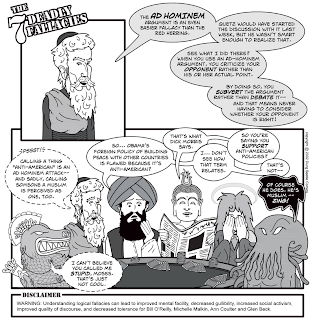In my two MCCC Logic classes I've just finished teaching Hurley's section on informal logical fallacies. One such fallacy (not mentioned by Hurley) is the genetic fallacy. The genetic fallacy is a type of "fallacy of relevance." That is, in logic, there are certain statements that have no relevance to the validity and soundness (in dedictive arguments), or probability and cogency (in inductive arguments) of an argument. Such as, e.g., one's life circumstances, psychological condition, personal biases, ethnic background, past and present experiences, and so on. For example, one could be a chainsmoker and make an argument that concludes with the statement "Therefore, you should not smoke cigarettes." The historical fact that the person making this argument is a chainsmoker is, logically and completely, irrelevant to the strength or weakness of the argument. So I, as a Christian theist, can make an argument for the truth of Christian theism and am immune from ad hominem accusations. This is an important thing to understand when it comes to logic. I find that many of my students consistently find this difficult to grasp. They are enamored with the perceived strength of ad hominem reasoning.
Dinesh D'Souza, in his new book Life After Death: The Evidence, talks about the genetic fallacy as used, he feels, by certain atheists. For example, it is a sociological fact that the statement Religious diversity exists is true. If you were born in India, as D.Souza was, you would most likely be a Hindu rather than a Christian or a Jew (as D'Souza was). While that sociological statement is true, its truth has (watch closely...) no logical relevance as regards the statements such as The Hindu worldview is true, or Christian theism is true. D' Souza writes:
"The atheist is simply wrong to assume that religious diversity undermines the truth of religious claims... [T]he fact that you learned your Christianity because you grew up in the Bible Belt [does not] imply anything about whether those beliefs are true or false. The atheist is guilty here of what in logic is called the "genetic fallacy." The term does not refer to genes; it refers to origins. Think of it this way. If you are raised in New York, you are more likely to believe in Einstein's theory of relativity than if you are raised in New Guinea. Someone from Oxford, England, is more likely to be an atheist than someone from Oxford, Mississippi. The geographical roots of your beliefs have no bearing on the validity of your beliefs." (38-39, emphasis mine)
As far as I can tell, that's just straight logic. Logic is about formulating and evaluating arguments. Arguments are made of statements, one or more of which is a premise, and one of which is a conclusion. From the premise(s) to the conclusion there must be a claim of inference. The claim of inference is the logic-thing. Apart from that, strictly speaking, philosopher-logicians are uninterested in any sociological, anthropological, or psychological data no matter if such data are true. Personally, I do think there are other ways to evaluate truth-issues than just brute logic. But, from a logical standpoint, D'Souza is correct when he says "The geographical roots of your beliefs have no bearing on the validity of your beliefs."
